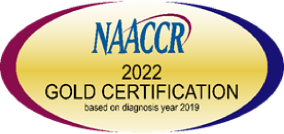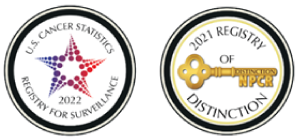Colorado Central Cancer Registry
What is a registry?
Complete statewide data on cancer
Data are collected by the CCCR as a participant in the National Program of Cancer Registries (NPCR) of the Centers for Disease Control and Prevention (CDC).
In this fact sheet, we provide you with:
- Background.
- Schedule of collection and data availability.
- Ways to access the data.
- Considerations for interpretation.
- Population represented.
- Disparities/inequities.
- Data collection details.
A cancer incidence rate is the number of new cancers of a specific site/type occurring in a specified population during a year, usually expressed as the number of cancers per 100,000 people.
A cancer mortality rate is the number of new deaths, with cancer as the underlying cause of death, occurring in a specified population during a year, usually expressed as the number of deaths due to cancer per 100,000 people.
Staging by county and gender, 2014-2016, 2017-2019.
Stage of disease at the time of cancer diagnosis is typically defined by tumor size and how far the tumor has spread throughout the body. For cancer sites that have measurable survival benefits when found in the earliest stages, early detection is the percentage of staged cases that are diagnosed in the in situ or localized, stages.
Five-year relative survival, 2009-2012, 2013-2016.
Survival rates are the proportion of patients alive at some point subsequent to the diagnosis of their cancer. This considers deaths from all causes, cancer or otherwise.
Cancer and Poverty, Colorado 2001-2012, revised March 2015
70 percent of Coloradans living in low-poverty areas survived cancer for at least five years. But for those who lived in areas of high poverty, the five-year survival rate was just 55 percent. Cancer is the leading cause of death in Colorado, killing more than 7,000 people each year.
Special reports
- Human Papillomavirus (HPV) and HPV-Related Cancers in Colorado: A Special Report.
- Analysis of Diagnosed vs. Expected Cancer Cases in the Pueblo Colorado Smelter Area, 1990-2015
- Cancer and poverty, Colorado 2001-2012 (revised March 10, 2015).
- Cancer and poverty, Colorado 1995-2006.
- Ratios of cancer incidence in 10 areas around Rocky Flats(1998).
- Ratios of cancer incidence in 10 areas around Rocky Flats (2016).
Information for cancer reporters
- About the Colorado Central Cancer Registry
- Promoting interoperability for the Colorado Cancer Registry
HIPAA
The Colorado Central Cancer Registry is the recognized public health authority for receiving this information. HIPAA does not obstruct any state law that supports or mandates the reporting of cancer for public health purposes. The CCCR takes every care to limit the protected health information disclosed for public health purposes to the minimum amount necessary within reason.
More data and statistics on cancer
- Data Request
- United States Cancer Statistics: The official federal cancer statistics site hosted by the US Centers for Disease Control and Prevention. Includes data visualizations, publications and state cancer profiles.
- Cancer Control PLANET: Plan, Link, Act, Network with Evidence-based Tools hosted by the National Cancer Institute. Provides access to data and resources that can help planners, program staff, and researchers design, implement and evaluate evidence-based cancer control programs.
- North American Association of Central Cancer Registries: Cancer incidence statistics for about 35 states and all Canadian provinces, and cancer mortality for all 50 states and all Canadian provinces.
- Surveillance, Epidemiology and End Results (SEER program at National Cancer Institute): Cancer incidence and survival statistics for the SEER area, which covers about 14 percent of the U.S., and mortality rates for all 50 states.
- American Cancer Society: Statistics for cancer mortality over time, expected cancers by state and cancer risk factors.
- American College of Surgeons and National Cancer Database: Data management system for hospitals and programs approved by the Commission on Cancer. It's co-sponsored by the American College of Surgeons and the American Cancer Society. The database helps physicians, cancer registrars and hospital administrators improve the management of care for cancer patients, and comparative studies produced from the data serve as both a quality assessment tool and an agent for quality improvement in oncology care.
Contact Information
- CCCR Main Line 303-692-2540
- CCCR Fax 855-839-0422
- cdphe.pscaregistry@state.co.us

